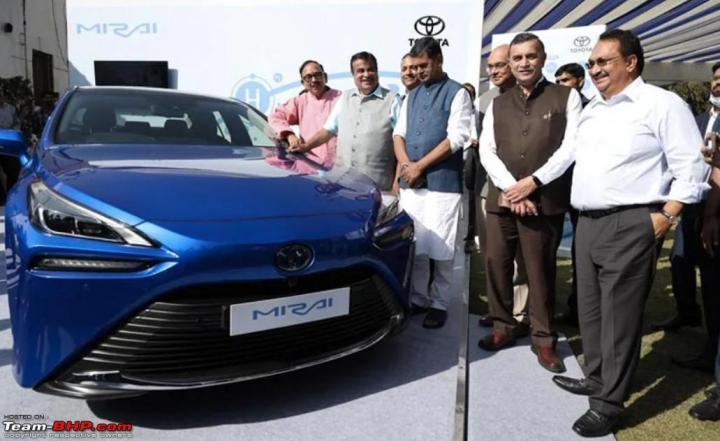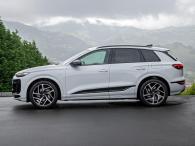News
Why Hydrogen Cars didn't quite make it, like Electric Cars did
Some of the inherent pros of hydrogen fuel cell vehicles are similar to battery electric vehicles.
There was a time when hydrogen cars and electric cars were both equally being predicted as the next big thing. Today, things have drastically changed and electric vehicles have clearly won the race, while hydrogen cars are nowhere to be seen. What exactly happened then?

Image Source - Innovation News Network
Before we get into the ‘what happened’ part, let’s quickly go through what is a hydrogen car or what is a hydrogen fuel cell vehicle.
As the name suggests, the ‘Hydrogen car’ uses hydrogen as the mode of propulsion. But we need to understand that there are 2 lines of thought regarding hydrogen propulsion. The first is using hydrogen as a fuel for combustion to power the vehicle. This can be done by heavily modifying an internal combustion engine to use hydrogen as a fuel. However, hydrogen, as we know, is difficult to handle. The modifications to the engine are extreme and there are many other challenges. Hence, this is not what we’re focusing on. Instead, we’re focusing on the second line of thought.
Hydrogen can also be used to power a vehicle without combustion. That’s where the concept of fuel cells comes into play. These fuel-cell hydrogen vehicles use the same kind of electric motor as we’ve seen in traditional electric vehicles. As you might have guessed, the only difference is that instead of a battery, you have fuel cells to power the electric motor.
These fuel cells contain a membrane through which hydrogen (H2) is made to pass where it combines with the oxygen (O2) from the air, which produces electricity and water vapour. The electricity produced is then transferred to the motor which drives the wheels.
Safety
Hydrogen is a very flammable gas and it can combust even with small amounts of normal air. If not handled properly, hydrogen is dangerous. However, the people working on hydrogen fuel cell vehicles are aware of this and the high-pressure storage tanks are designed to withstand extreme impacts. In fact, some even state that in the worst of crashes, the hydrogen tanks would survive even if the entire car won't. So, to answer that question, hydrogen fuel cell vehicles are safe. Also, there have been no injuries or deaths reported in the small number of cars sold. Internationally, there are a few cars on sale like the Toyota Mirai, Honda CR-V e:FCEV, Hyundai Nexo, MG Euniq 7 and more. As per most international reviews, the driving experience is similar to battery electric vehicles, but not the super quick ones.

Advantages
Some of the inherent pros of hydrogen fuel cell vehicles are similar to battery electric vehicles. They’re smooth to drive and there’s no noise. They do not emit any harmful gases from the exhaust, only water vapour. The biggest advantage that they have over battery electric vehicles is that the charging time is significantly less. You can refuel in just 5 minutes for a range of approximately 500 km.
Disadvantages
The biggest challenge for hydrogen fuel cell vehicles is the availability of hydrogen itself. When we think about the infrastructure challenges with electric vehicles, the same with hydrogen is even bigger. Currently, hydrogen is produced using fossil fuels. But then this defeats the purpose as the main purpose of a hydrogen fuel cell vehicle is to reduce emissions. Using renewable energy sources to produce hydrogen is still not commercially viable.
Another way to produce Hydrogen is through electrolysis, which needs a high amount of electrical energy. According to Wikipedia –
Current best processes for water electrolysis have an effective electrical efficiency of 70-80%, so producing 1 kg of hydrogen (which has a specific energy of 143 MJ/kg or about 40 kWh/kg) requires 50–55 kWh of electricity.
Let’s do some simple calculations for the Toyota Mirai. It has a hydrogen tank capacity of 5.6 kg and the real-world range (as per some of the international reviews) is ~500 km (647 km claimed by Toyota). So that’s roughly 90 km per kg of hydrogen. This means that 55 kWh of electricity is used for the car to travel 90 km. Compare that with an electric vehicle like the BYD Atto 3, which uses 60 kWh of electricity for a full charge and can run for roughly 400 km. This is where I feel the case for Hydrogen fuel cell vehicles falls apart.

Not just this, more work needs to be done in reducing the production, transportation and storage costs of hydrogen. But in all fairness, it seems like an uphill battle against EVs. A couple of years back, the Mirai was even being evaluated for India, but I don't think any progress was made on that front.
What do you think? Will we see a time when hydrogen fuel cell vehicles will be mainstream in India?
Here's what BHPian RunGaDa had to say on the matter:
The last time I checked a Hydrogen powered car would cost 100,000 USD as start price and the hydrogen refilling station would be 1 million USD.
Is that affordable for India? At least for India it is not possible.
If some minister is taking his heavy weight and riding one to show off its tomfoolery.
Here's what BHPian Jeroen had to say on the matter:
As with so many competing technologies it was not the best technology that matured first. It was the technology that one man believed in a pushed through. Musk made the EV happen. Not because it was the best technology perse, but just because he liked it and believed in it.
There are many comparable stories. The best solution is cast aside whilst the world adopts to the whims on one company.
The fact that the Hindenburg comes into the comparison is, if anything, a good indication, how little is known about the properties of hydrogen. The Hindenburg skin caught fire, probable due a lightning strike. It was the skin of the airship that caught fire. Its cloth was impregnated with some sort of aluminium paint. It was extremely flammable. Look at the footage. Once the hydrogen ignites there is no explosion, all hydrogen is burned off in seconds! Had that been a fuel filled blimp, or full of batteries it would have burned for days, at a much higher temperature and it might have well exploded!
We should also not forget why we are transitioning to electric cars. First and foremost it is about the environment. So electricity and hydrogen should always be seen in that context and all of it varies applications. Hydrogen is already well used in industrial applications.
We see a current renewed interest in hydrogen because we are beginning to realize that EVs and electricity alone is not going to allow us to reach our environmental goals.
We need to develop and enhance multiple technologies. For this very reason we see a renewed interest in nuclear power generation. Countries that frowned upon nuclear power are now planning to build nuclear plants.
Currently here in Western Europe we already have busses, trucks, barges, portable generators running on Hydrogen. The Netherlands has one of the most dense gas transport systems in the world. Both on an industrial scale as well as home application. Almost every house, apartment in the Netherlands is using gas for heating.
A normal domestic gas central heater can be fired with hydrogen. Doesn’t need any modification! Currently a massive program is underway to upgrade the piping infrastructure from natural gas to hydrogen.
A lot of the challenges hydrogen does have will be overcome with new techniques, just as new and innovative thinking brought the EV to its current state. (Which is far from perfect as we know). And to overcome the very limited thinking of the public at large. People don’t want change. We want the exact same car as before. The same dimensions, the same space, the same performance, the same range and so on. Just change out that old IC. How hard can it be.
Infrastructure to charge or fill up is a big challenge. You only have to look at threads on EVs in this forum to get a feel for it. And, not surprisingly, members are not particularly happen with current ranges and charging infrastructure.
Partly, my opinion, is because we don’t see beyond our experience from yesterday. We are used to pull up at a petrol station and fill up. But the great thing about an EV is its ability to be charge almost anywhere. In front of your home, at work, at the supermarket. So range doesn’t have to be an issue at all. Most people would do fine with a 250 km range. Still, all of the internet moans about range.
But we don’t want to change our ways. We still want to have that 700-1000 km range.
We don’t want hydrogen because the internet keeps comparing it to exploding blimps. Let’s look beyond the trodden paths. If we don’t nothing will ever chance. I am no fan of Musk, but at least he can look beyond current technical limitations.
Here's what BHPian lina had to say on the matter:
I think everyone is missing a point here. How do you want to transport energy?
The electric grid is by far the best means to transport energy. Most places already have the infrastructure and it is a scalable technology that can be controlled very well. The problem with things like hydrogen is that you are transporting energy in the form of fuel much like how we transport petrol or crude or wooden logs. Except that this fuel needs to be made unlike petrol or LPG. It also requires all sorts of new infra to be setup. For the same reason Im completely against using LPG, CNG etc. Burn them at source and transport the energy via the grid. Yes, Im all for stopping the use of LPG in homes too. We already have electricity coming in. Make that reliable and use it for all our energy needs. I do not understand why cities like Bangalore are investing in CNG infrastructure. In the long term these are just hazards. We have already seen multiple instances where these pipes have broken. Infact an entire metro line was shifted because of CNG pipes (nagawara-airport pink line).
Why would you want to repeat this whole nonsense once again for Hydrogen. Just leave it.
Thus for cars I feel Battery powered EVs are a far better choice. The grid already exists and it is getting cleaner. It needs to get smarter to make use of the energy produced efficiently but we will get there. Batteries are getting better too. The current LFP tech itself meets the demand of most people. 400-500km range with 5L km+ life.
Transport should also shift to more electric-friendly forms of transport. This means more emphasis on trains/trams etc so that we do not have to carry around 1000s of kgs of energy unnecessarily. As mentioned earlier, the best way to transport energy is the grid. Make use of it as much as possible instead of carrying around petrol or lithium.
Read BHPian comments for more insights and information.



















